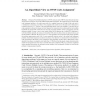Free Online Productivity Tools
i2Speak
i2Symbol
i2OCR
iTex2Img
iWeb2Print
iWeb2Shot
i2Type
iPdf2Split
iPdf2Merge
i2Bopomofo
i2Arabic
i2Style
i2Image
i2PDF
iLatex2Rtf
Sci2ools
107
click to vote
STACS
2004
Springer
2004
Springer
An Algorithmic View on OVSF Code Assignment
OrthogonalVariableSpreadingFactor(OVSF)codesareusedinUMTStosharetheradiospectrum among several connections of possibly different bandwidth requirements. The combinatorial core of the OVSF code assignment problem is to assign some nodes of a complete binary tree of height h (the code tree) to n simultaneous connections, such that no two assigned nodes (codes) are on the same root-to-leaf path. A connection that uses a 2−d fraction of the total bandwidth requires some code at depth d in the tree, but this code assignment is allowed to change over time. Requests for connections that would exceed the total available bandwidth are rejected. We consider the one-step code assignment problem: Given an assignment, move the minimum number of codes to serve a new request. Minn and Siu propose the so-called DCA algorithm to solve the problem optimally. In contrast, we show that DCA does not always return an optimal solution, and that the problem is NP-hard. We give an exact nO(h)-time algorithm,...
Code Assignment Problem | One-step Code Assignment | OVSF Code Assignment | STACS 2004 | Theoretical Computer Science |
Related Content
| Added | 02 Jul 2010 |
| Updated | 02 Jul 2010 |
| Type | Conference |
| Year | 2004 |
| Where | STACS |
| Authors | Thomas Erlebach, Riko Jacob, Matús Mihalák, Marc Nunkesser, Gábor Szabó, Peter Widmayer |
Comments (0)

